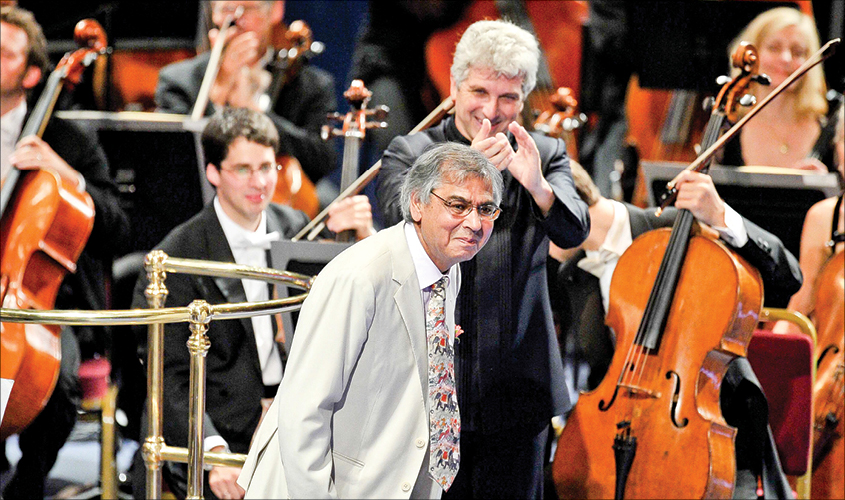Naresh Sohal, who passed away earlier this year, was the first India-born composer to receive global acclaim in Western classical music, and the first NRI to be awarded the Padma Shri.
Naresh Sohal, whose compositions—such as The Cosmic Dance and The Divine Song among others—have been performed by the likes of the London Philharmonic Orchestra and the BBC Symphony Orchestra, passed away on 30 April of a heart attack near his home in the southeast of London. The 78-year-old was the first India-born composer to win international acclaim in Western classical music.
He was a composer in the “Western style”, Sohal’s wife, Janet Swinney, told Guardian 20. “In Indian classical music, the ragas were established according to specific formulae centuries ago, and the performers extemporise around these formulae. This idea of ‘the composer’ doesn’t exist in the same way as in Western classical music, where the composer is at liberty to create works completely from scratch.”
Born on 18 September 1939 in Punjab, Sohal developed an interest in music at an early age. By the time he got enrolled in college, he had acquired a harmonica and had started to perform rock-and-roll and Indian film songs at college functions and social gatherings. He also composed music for the Punjab Armed Police band, providing them with waltzes and marches.
Sohal decided to learn Western classical music after being turned away by a music teacher in Punjab who refused to give him Indian classical lessons on the mouth organ. He dropped out of college a month before his final exams in search of people who could teach him music. His first encounter with a European classical work—Eroica by Beethoven— happened in 1961. He heard the piece on the radio when he was in Mumbai trying his luck as a music composer in Bollywood. It was after this experience that he decided to explore more commitedly the Western classical form of music.

In 1962, Sohal, at age 22, arrived in London with just two pounds in his pocket. After a few hard months, he got a job as a copyist at a music-publishing firm. His work then included copying out musical notations and scores for other composers, such as Benjamin Britten and the Iannis Xenakis.
Deeply influenced by Xenakis’ composition Eonta, Sohal learned his biggest lesson—that music is as much about melodies and notes as it is about ideas—from the Greek composer.
While working as a copyist, Sohal studied music theory at the London College of Music and was trained under composer Jeremy Dale-Roberts. Asht Prahar (1965), his first composition, was a musical expression of the eight periods of the day. The piece was selected for a public concert at the Royal Festival Hall, where it was performed by the London Philharmonic Orchestra under the conductor Norman del Mar in 1970.
Soon, Sohal’s work was being performed by some of the most prestigious orchestras and artistes across the world, including the BBC Symphony Orchestra, the New York Philharmonic, the Israel Philharmonic, the Berlin Staatskapelle and others.
Sohal created close to 70 compositions in his career of more than four decades. The champions of his music include renowned conductors like Zubin Mehta and Sir Andrew Davis.
A “natural composer”, as he was often called, Sohal’s compositions were inspired by cosmology, Indian philosophy and the European classical tradition. One of his most popular works, The Cosmic Dance (2013), which was also his last piece at the BBC Proms, drew inspiration from similarities between the Big Bang theory and the description of the creation of the universe in centuries-old Sanskrit texts like the Rig Veda and the Upanishads.
Another of his renowned compositions, The Divine Song (2010), is based on Chapter 2 of the Bhagavad Gita. It was performed in Tel Aviv by the Israel Philharmonic Orchestra with Zubin Mehta as the conductor. It was Sohal’s gift to Mehta on his 70th birthday. He also wrote music for a ballet based on the life of the Buddha, and his orchestral work, Lila is about the process of spiritual enlightenment.
Despite the strong influence of Indian philosophy on his music, Sohal often objected to labelling his work on the basis of geography or regional identity; he believed in the artist’s individual imagination, which defies categorisation.
Sohal was awarded the Padma Shri for his contribution to music in 1987. He was the first non-resident Indian to receive this honour.
“As his life partner for over forty years, I can say that he was a man of great self-discipline. He was good at cricket, chess, photography and badminton, but he gave all these up when they began to interfere with his compositions. His daily routine revolved around the practice of meditation and the composition of music. He was a true sadhaka [seeker],” said Janet.
To know more about Naresh Sohal, visit www. nareshsohal.com

